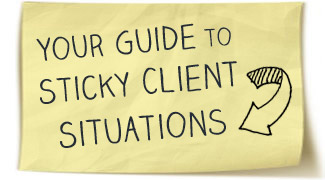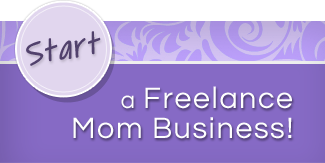These three “S’s” of short-term success are especially useful if you don’t know what exactly it is that you want to do but want to take advantage of the low-hanging fruit available to you.
When you first start to think about branching out on your own, whether that’s freelancing or putting an entrepreneurial idea to the test, what are the things that stop you in your tracks?
- Nervous about generating enough income?
- Scared you don’t have what it takes to see an idea through to execution?
- Worried about what you envision might be a 24-7 responsibility you can’t leave at work because work is, in fact, at home?
However, if you decide you’ll define success, you probably imagine it as the pot of gold at the end of the rainbow. It is a long-term goal. You don’t expect to achieve it instantaneously. You don’t…right? But you’re also a mom, and as a mom you’re hyper-aware of all the short-term needs in your midst – yours, your family’s, the dog’s…so while your long-term success is a vision you can work toward, in the short-term you also need the three S’s: Solvency, Self-esteem, and Sanity.
The First S – Solvency
Financial solvency is a no-brainer. If you’re a main breadwinner, this may be the most important “S” by far; if you have another reliable method of support for your family, it may be a lesser concern. Regardless, chances are you need or want to profit in some way from your venture – otherwise, you’d be reading up on hobbies, not freelance work.
For some, this means earning some extra income in smaller increments and saving up prior to quitting a more traditional job. For others, it just means not making a big investment upfront. In his book, Crossing the Chasm, Geoffrey Moore suggests that the key to successful selling and marketing is to find a niche – not just a niche product or service, but also the niche audience who is most likely to buy from you. That may be people who’ve vacationed in Italy, people who play an instrument, people with non-profit work experience, or something even more specific than that.
It may go against your instincts to narrow the focus of your consumer base, but it will save you time and money in marketing. When you are first starting out, it is even more important for everything you do to reward you in some way.
The Second S – Self-Esteem
A major draw of freelance or entrepreneurial work is that it lets you tap into talents and skills you may not be fully utilizing in a corporate career. In that way, even though going rogue with your work might scare you, it should also bring out the best in you. It can be a huge boost to your self-esteem if you start out with work you’re naturally interested in and that you feel you’re “designed” to do.
That said, what you’re good at – your low-hanging fruit – may be much higher up on the tree for someone else.
My friend Anastasia started out with something that seems very risky – flipping houses. Her goal was to earn $50,000 in revenue the first year, and she determined that she’d need to fix and flip five houses to come close to that amount. She didn’t need an office, a permanent staff, a website, or an inventory, just the patience to search for and jump on the right deal and contract for the right professional services to fix it up.
It sounded to me like a huge and scary investment, but she takes it one house at a time, and with her skill set, it is more predictable work than trying to start an online business would be. She found that as long as she accurately judges the home’s value, the lack of overhead cost and high profit per project pay off. By following her instincts, she got right into a line of work that suits her, instead of struggling through smaller endeavors that may have challenged her confidence in being an entrepreneur.
It doesn’t have to be a house – your low-hanging, self-esteem-building fruit could be any product with low overhead that sells at a high profit and is desirable to a wide base of consumers.
Your product may also be your experiences and expertise, and one of the easiest ways to take advantage of what you’re already got stored up in your brain is to write an ebook. Anyone can write and self-publish an ebook. Sites like Authorator.com and Workflowy.com can help you start out managing your writing work and take the initial steps to being an author. There are plenty of easy ways to market and make your ebook available for purchase; it’s all a matter of how far you want to go with it.
The Third S – Sanity
There is an easy way to approach finding the low-hanging fruit. Following a proven path is not only smart – it makes for a sane entrepreneur.
Finding the right prospects or customers, no matter what it is you’re trying to sell (product, idea, or service), can drive you crazy. Especially when you know you have what someone needs or wants– you just can’t pinpoint who that someone is well enough to be profitable.
Stay sane by focusing your energy on the right customers or prospects, the ones that already have shown interest in you, and following up with them effectively using this chart idea from the Client Attraction System. Always follow up; you never know what you might find






